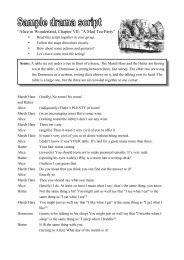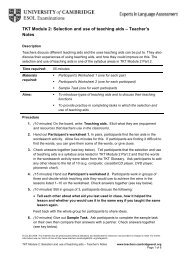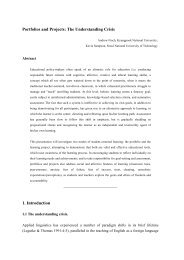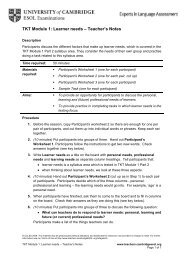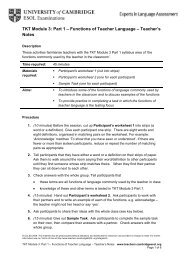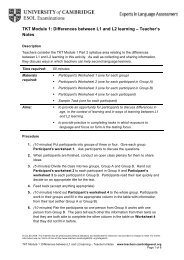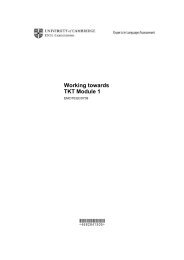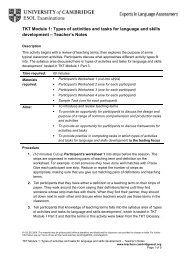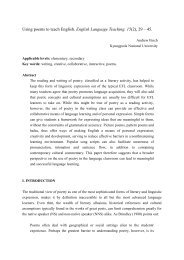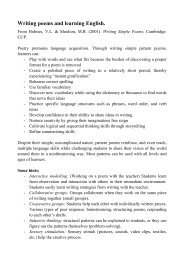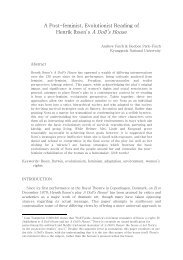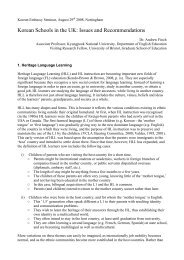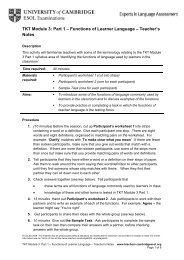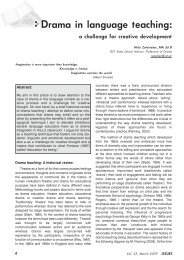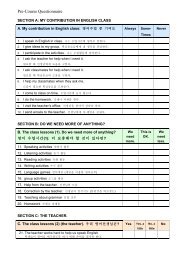Categorising learners' mistakes - Finchpark
Categorising learners' mistakes - Finchpark
Categorising learners' mistakes - Finchpark
You also want an ePaper? Increase the reach of your titles
YUMPU automatically turns print PDFs into web optimized ePapers that Google loves.
TKT Module 3: <strong>Categorising</strong> learners’ <strong>mistakes</strong> – Teacher’s Notes<br />
Description<br />
Teachers consider the different types of <strong>mistakes</strong> that learners make and practise<br />
categorising them. They also do a sample exam task on this TKT Module 3 Part 1 syllabus<br />
area of categorising learners’ <strong>mistakes</strong>.<br />
Time required: 60 minutes<br />
Materials<br />
required:<br />
Participant’s Worksheet 1 (cut into strips and one for each<br />
participant)<br />
Participant’s Worksheet 2 (cut into strips, one set per pair)<br />
Sample Task (one for each participant)<br />
Aims: To provide an opportunity for participants to discuss learners’<br />
<strong>mistakes</strong> and to categorise learners’ <strong>mistakes</strong><br />
Procedure<br />
To provide practice in completing tasks focusing on categorising<br />
learners’ <strong>mistakes</strong><br />
1. Before the session, cut Participant’s worksheet 1 into strips so there is one strip for<br />
each participants. Repeat or remove some strips if you have more or fewer<br />
participants in your group. You will also need to copy Participant’s worksheet 1 so<br />
there is one complete copy for each participant.<br />
Copy Participant’s worksheet 2 and cut each one into strips, so there is one set of<br />
strips per pair of participants.<br />
2. (10 minutes) Give each participant a strip from Participant’s worksheet 1. Each<br />
statement or a question has a mistake. Participants walk around the room saying<br />
their sentences or questions to other participants, who should correct the mistake.<br />
3. Check answers together (see key below). Participants read out the sentence or<br />
question with the mistake, then identify the mistake and correct it. Avoid discussing<br />
the type of error as this will be done at a later stage in the session.<br />
4. Tell participants that the area of categorising learners’ <strong>mistakes</strong> is tested in TKT<br />
Module 3 Part 1. Ask participants:<br />
What are some of the categories for learners’ <strong>mistakes</strong>? (grammar <strong>mistakes</strong>,<br />
spelling <strong>mistakes</strong>, vocabulary <strong>mistakes</strong>, punctuation <strong>mistakes</strong>, pronunciation<br />
<strong>mistakes</strong>)<br />
5. (15 minutes) Give each participant a complete copy of Participant’s worksheet 1,<br />
and each pair a set of cut-up strips from Participant’s worksheet 2. In pairs,<br />
participants categorise the <strong>mistakes</strong> by matching the type of mistake to the example<br />
sentence.<br />
© UCLES 2009. This material may be photocopied (without alteration) and distributed for classroom use provided no charge is made. For further<br />
information see our Terms of Use at http://www.teachers.cambridgeESOL.org/ts/legalinfo<br />
TKT Module 3: <strong>Categorising</strong> learners’ <strong>mistakes</strong> – Teacher’s Notes www.teachers.cambridgeesol.org<br />
Page 1 of 6
6. Check answers together (see key below). Participants should keep the task for the<br />
next exercise.<br />
7. (15 minutes) Still in pairs, each pair should choose two of the categories of learner<br />
<strong>mistakes</strong> from Participants worksheet 2. They should write an example sentence<br />
with a learner mistake for the categories chosen.<br />
8. Put participants into groups of four. In their groups, participants read out their<br />
sentences with learner <strong>mistakes</strong> and the other participants in their group identify the<br />
category of error.<br />
9. (15 minutes) Give out Sample Task. Ask participants to complete the sample task<br />
on their own then compare their answers with a partner. Check answers together.<br />
10. (5 minutes) Round up to summarise points covered. Ask participants:<br />
What is the TKT Module 3 syllabus area for this lesson? (categorising<br />
learners’ <strong>mistakes</strong>)<br />
What are candidates being tested on? (candidates are tested on their<br />
knowledge of different types of <strong>mistakes</strong>)<br />
How easy/difficult do you think this syllabus area will be? (allow participants<br />
to share views)<br />
© UCLES 2009. This material may be photocopied (without alteration) and distributed for classroom use provided no charge is made. For further<br />
information see our Terms of Use at http://www.teachers.cambridgeESOL.org/ts/legalinfo<br />
TKT Module 3: <strong>Categorising</strong> learners’ <strong>mistakes</strong> – Teacher’s Notes www.teachers.cambridgeesol.org<br />
Page 2 of 6
TKT Module 3: <strong>Categorising</strong> learners’ <strong>mistakes</strong> – Answer Keys<br />
Key to Procedure Step 3<br />
1. I am like football very much.<br />
2. Every festival are is different in my country.<br />
3. We must to protect the environment.<br />
4. What time did you say you were going out later?<br />
5. I’m going to wear my leather red red leather jacket.<br />
6. The weather in London is badder worse than the weather in Tokyo.<br />
7. I go went to the cinema last week.<br />
8. He worked very hardly hard to finish the project.<br />
9. Don’t blame you yourself. It’s not your fault.<br />
10. They’ve been away since for a long time.<br />
11. I like listening to classical music.<br />
12. That must be the dress who which/that you bought last week.<br />
Key to Procedure Step 6<br />
1 K 2 F 3 A 4 H 5 L 6 B<br />
7 C 8 J 9 D 10 E 11 I 12 G<br />
Key to Sample Task<br />
1 B 2 B 3 D 4 A 5 C<br />
6 A 7 D 8 D 9 B 10 A<br />
© UCLES 2009. This material may be photocopied (without alteration) and distributed for classroom use provided no charge is made. For further<br />
information see our Terms of Use at http://www.teachers.cambridgeESOL.org/ts/legalinfo<br />
TKT Module 3: <strong>Categorising</strong> learners’ <strong>mistakes</strong> – Answer Keys www.teachers.cambridgeesol.org<br />
Page 3 of 6
TKT Module 3: <strong>Categorising</strong> learners’ <strong>mistakes</strong> – Participant’s<br />
Worksheet 1<br />
In pairs, match one of the categories of <strong>mistakes</strong> (A–L) with a learner’s mistake below<br />
(1–12).<br />
1. I am like football very much.<br />
2. Every festival are different in my country.<br />
3. We must to protect the environment.<br />
4. What time did you say you going out later?<br />
5. I’m going to wear my leather red jacket.<br />
6. The weather in London is badder than the weather in Tokyo.<br />
7. I go to the cinema last week.<br />
8. He worked very hardly to finish the project.<br />
9. Don’t blame you. It’s not your fault.<br />
10. They’ve been away since a long time.<br />
11. I like listening classical music.<br />
12. That must be the dress who you bought last week<br />
© UCLES 2009. This material may be photocopied (without alteration) and distributed for classroom use provided no charge is made. For further<br />
information see our Terms of Use at http://www.teachers.cambridgeESOL.org/ts/legalinfo<br />
TKT Module 3: <strong>Categorising</strong> learners’ <strong>mistakes</strong> – Participant’s Worksheet 1 www.teachers.cambridgeesol.org<br />
Page 4 of 6
TKT Module 3: <strong>Categorising</strong> learners’ <strong>mistakes</strong> – Participant’s<br />
Worksheet 2<br />
A wrong verb pattern<br />
B wrong comparative form<br />
C wrong tense<br />
D wrong pronoun<br />
E wrong preposition<br />
F wrong subject-verb agreement<br />
G wrong relative pronoun<br />
H missing auxiliary verb<br />
I missing preposition<br />
J wrong adverb form<br />
K unnecessary auxiliary verb<br />
L wrong word order<br />
© UCLES 2009. This material may be photocopied (without alteration) and distributed for classroom use provided no charge is made. For further<br />
information see our Terms of Use at http://www.teachers.cambridgeESOL.org/ts/legalinfo<br />
TKT Module 3: <strong>Categorising</strong> learners’ <strong>mistakes</strong> – Participant’s Worksheet 2 www.teachers.cambridgeesol.org<br />
Page 5 of 6
TKT Module 3 <strong>Categorising</strong> learners’ <strong>mistakes</strong> – Sample Task<br />
For questions 1–9, match the underlined <strong>mistakes</strong> in the student composition with the types<br />
of mistake listed A–D. You need to use some options more than once.<br />
Student composition Type of mistake<br />
1 People like to live in specail places. They prefer to design<br />
2 there own house, not live in an old house. I always think<br />
3 about design my own house in the future.<br />
4 Every day I have new idea. I don’t know which idea I<br />
5 should use, one of my ideas is a house on the beach.<br />
6 First of all, I would like the house to be long way from<br />
7 the city. I also want it being big and strong. That way<br />
8 I can relax and to have fun. Secondly, the design of<br />
the living room is very important. I want a big screen<br />
9 TV with an exellent sound system.<br />
10 Rest of the house will be empty for future plans.<br />
A articles<br />
B spelling<br />
C punctuation<br />
D verb forms<br />
© UCLES 2009. This material may be photocopied (without alteration) and distributed for classroom use provided no charge is made. For further<br />
information see our Terms of Use at http://www.teachers.cambridgeESOL.org/ts/legalinfo<br />
TKT Module 3 <strong>Categorising</strong> learners’ <strong>mistakes</strong> – Sample Task www.teachers.cambridgeesol.org<br />
Page 6 of 6



